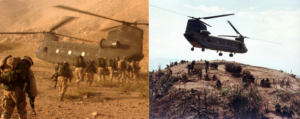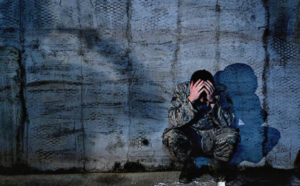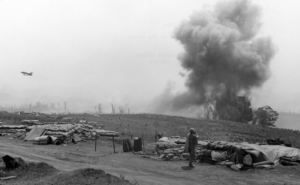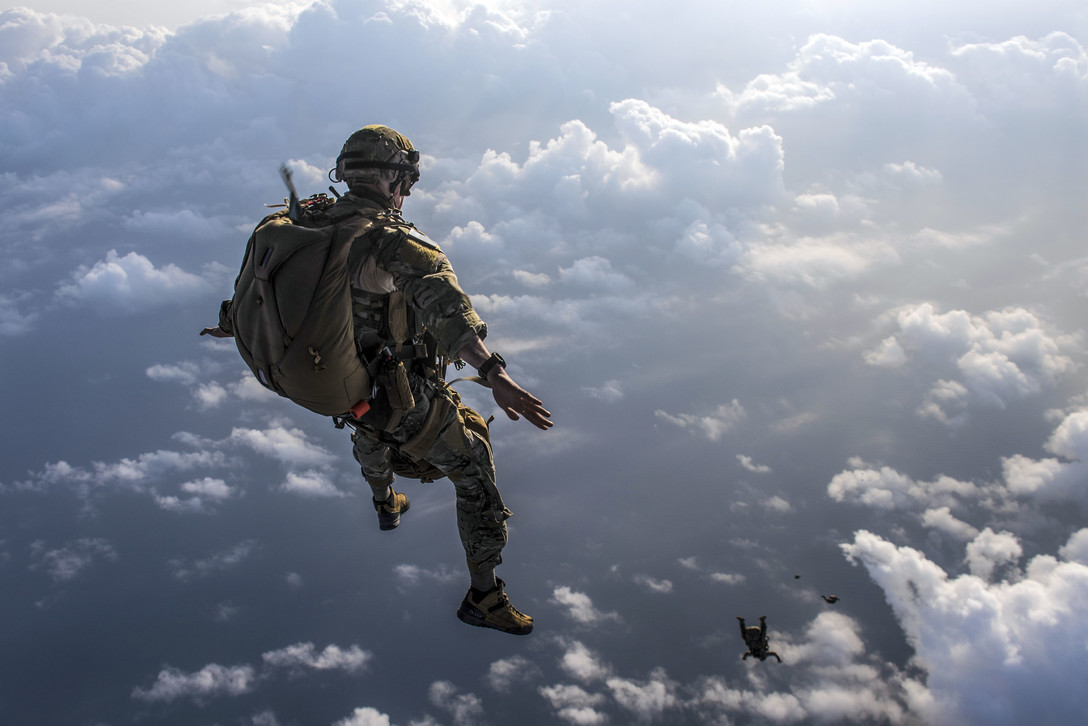
Left: Soldiers quickly march to the ramp of the CH-47, Sept. 4, 2003, Afghanistan. U.S. Army photo by Staff Sgt. Kyle Davis. Right: Troops unload from CH-47 in the Cay Giep Mountains, 29-30 Oct 1967.
This post is an original article written by Keith Nightingale. COL Nightingale is a retired Army Colonel who served two tours in Vietnam with Airborne and Ranger (American and Vietnamese) units. He commanded airborne battalions in both the 509th Parachute Infantry Regiment and the 82nd Airborne Division. He later commanded both the 1/75th Rangers and the 1st Ranger Training Brigade.
For some, the time of combat is just the length of the tour. For others, they are always at war. For some, facets of a personal war are shrouded in the labyrinth of the mind-only to occasionally emerge to be seen by others. For all who experienced it, combat is a constant-sometimes controlled, sometimes not as are all life events. The person you see across the room or sitting in the subway may be in a place you cannot travel and he or she is dealing with issues you cannot see but they are very real. If the mind contains the distilled residue of the person’s experience, some live constantly in a very dark and ferocious place while others may be blessed with sunshine. It’s all very personal.
The smoke of battle may clear the field, but its residue resides in the minds of those who first saw its shades, tremors and drifts erupt at time since passed. A spark of suggestion may bring it back from the darkest recesses to which the individual relegated it to the brightest light of recognition and reaction. The war is always with you.
To some, it is shallow and always present-obscuring and modifying the present with highlights from the past. To others, it sits in quiet solitude amongst the denser neurons and erupts after only the strongest of impulses and the passage of time. It is the shadow world of the mind and resides within anyone who has seen the tiger who always awaits a moment to spring forth and alter the present peace with the residue of the personal past.
Each participant in our wars returns with a personal kit of both controls and the uncontrolled and unprogrammable impulse of memories- One to counterbalance the other. Each person works to deal with a world they left in their own way-succeeding or failing as personal nature and makeup dictates while the constant combat between impulses and controls ebbs and flows within.
A child looks at his father, returned from his last of several deployments and asks the question-“Were you in combat?” For those that experienced the great difference between just deploying and serving and those that were seriously mortally engaged, the answer would have to be Yes…But…it’s not that simple and much less opaque to the participant.
Combat changes people. It is not a simple matter of leaving it all behind when one boards the plane to return home. Everyone has some secret file cabinets of the mind that store the emotionally searing moments and darker residue of their lives. For the combat veteran, this vault can be quite extensive and subject to unprogrammed withdrawals and viewings. The human coping mechanism provides a variety of resolutions that each person draws upon to keep the vault closed and unknown to his or her domestic companions and relationships.
On the surface, there appears normality. Underneath, the suppressive mechanisms are hard at work keeping the darkness away. In many cases, the bearer is unaware of the activities until in some specific moment, gesture or scene, the past becomes present and a new part of the person is noted. Domestic relationships become adjusted as new aspects of a personality emerge. New obsessions, behavioral patterns, long moments of silence, inability to communicate as in the past or just a distant eye on a quiet day indicating the vault is opening. “Yes. I was in combat today-and always will be.”

U.S. Air Force photo illustration/Airman 1st Class Corey Hook
Walking through a farm field, aspects of the terrain take on new significance. Fields of fire are mentally plotted. The best defensive terrain is selected. Likely avenues of approach are scanned and noted. The new corn and soybean fields are seen as visual distractors as the mental military calculus unfolds-not to be noted by the walking companion who sees only the progress of the green. The fields he walked as a boy with his father are no longer friendly.
Crossing the street, a judgment is made as to sniper placement, the best building access point, the location of covering forces and the best position for over watch. Starbucks is just across the walkway but there is an imaginary platoon securing its perimeter.
The most important game of the year is on the tube a bright Sunday morning. A phone rings and a conversation unfolds. The game is ignored for considerable time. The conversationalists agree to meet at a specific time and place. The life partner mentions the conflict with an important family event. Unfortunate but this is more important and has to be done. This person on the other end was with me one dark day.
The helicopter ambulance passes overhead. A quick glance from sound to sight opens the vault full wide. Out pours a scene of some time ago with dust, smoke, streaking tracers, sudden explosions and enshrouding dark silence accompanied by great pain. No one else sees that but the one that opened the vault. Despite his location, he is in combat.
In a quiet moment, he can hear past conversations that are unheard by other people in the room. They are of hard cynical jokes with a morbid dark sense of humor. He hears the talk and in his mind’s eye the faces of his fellow soldier’s with shoulders against the mud dike of an unnamed village just discernible in the silver grey light of a dawn. We survived the night. Now we have to work on the day. “One more day God. One more day.” There is a pause in the room while everyone looks at him as he returns from his world to theirs.

The kitchen has always been the repository of the best of family feelings. The aroma of a roast, a soup ora favorite pastry unlocks the most pleasant of memories. Sometimes, for whatever reason of stimulus-the aroma changes. It is harsh with cordite, hot JP 4 and the ugly deep breath of a newly opened abdomen. Blood has a unique odor that lingers far longer than it takes to wash off the hand. The reason for the sudden grimace amongst all the goodness is lost on the room. To clear his head, he walks out the door. The rich earth of his home yard as he rakes the rose bed suddenly becomes that pungent odor of the village last cleared. He is back from the war but he is still in combat.

A U.S. Air Force North American F-100 Super Sabre drops its bombs close to the Khe Sanh Combat Base, in 1968. Moore, USMC
Purple Hearts are awarded for wounds received in combat. The regulations require that they be the result of hostile action and require medical treatment. For those that receive the award, the wound is and was obvious. There is no provision for mental wounds and the weight carried by each combat participant as he or she struggles to keep that dark vault closed. Observers are privy to moments but never see the whole catalogue enclosed in the labyrinth of the mind. There is no Purple Heart authorization for wounds not seen and not treated-but they are wounds nonetheless. The child’s innocent question-“Were you in combat?”-requires an affirmative answer. “Yes. I was in combat and I am now.” There are many more wounds than awards.
Did you enjoy this post? Please comment below and share with your network in order to join the conversation regarding veteran mental health. You can sign up for updates from Head Space and Timing and follow Keith on Facebook and LinkedIn.



1 Comment
George Perrin · February 1, 2017 at 9:31 pm
Poignant!
Comments are closed.